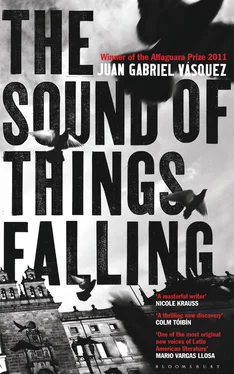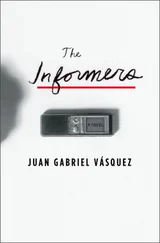‘So, what’s it gonna be?’ said Valenzuela. ‘Cartagena is out, so’s Santa Marta. They’re already full. Everyone wants to go there, to be on the Caribbean.’
‘I don’t want to go to a city,’ said Elaine Fritts.
‘No?’
‘I think I can learn more in the countryside. The spirit of a people is in its campesinos .’
‘The spirit,’ said Valenzuela.
‘And a person can help more,’ said Elaine.
‘Well, that too. Let’s see, tropical or temperate?’
‘Wherever I can be more helpful.’
‘Help is needed all over, miss. This country is still only half-baked. Think about what you know as well, the things you do well.’
‘Things I know?’
‘Of course. You’re not going to go plant potatoes if you’ve never even seen a photo of a hoe.’ Valenzuela opened a brown folder that had been beneath his hand the whole time, turned a page, looked up. ‘George Washington University, journalism major, right?’
Elaine nodded. ‘But I have seen hoes,’ she said. ‘And I learn fast.’
Valenzuela grimaced with impatience.
‘Well, you’ve got three weeks,’ he said. ‘That, or become a burden and make a fool of yourself.’
‘I’m not going to be a burden,’ said Elaine. ‘I. .’
Valenzuela shuffled some papers, took out a new folder. ‘Look, in three days I’m meeting with the regional leaders. I’ll find out there who needs what, and I’ll find out where you can do your field training. But what I know for sure is that there’s a place near La Dorada, do you know where I mean? The Magdalena Valley, Miss Fritts. It’s far away, but it’s not another world. In this place it’s not quite as hot as in La Dorada, because it’s a little way up the mountain. You go by train from Bogotá, it’s easy to get to and get back from, you’ll have noticed that the buses here are a public menace. Anyway, it’s a good place and not much in demand. It’d help to know how to ride a horse. It’d help to have a strong stomach. There’s a lot of work to be done with the people from Acción Comunal, community development, you know, literacy, nutrition, things like that. It’s just three weeks. If you don’t like it, it won’t be too late to change your mind.’
Elaine thought of Ricardo Laverde. Suddenly, having Ricardo a few hours away by train seemed like a good idea. She thought of the name of the place, La Dorada, and translated it in her head: The Golden One.
‘La Dorada,’ said Elaine Fritts, ‘sounds good.’
‘First the other place, then La Dorada.’
‘Yes, that place too. Thanks.’
‘OK,’ said Valenzuela. He opened a metal drawer and took out a piece of paper. ‘Look, before I forget. This is for you to fill in and return to the secretary.’
It was a questionnaire, or rather a carbon copy of a questionnaire. The heading was just one question, typed in capital letters: What are some of the things which you have found different about your home in Bogotá? Below the question were several subheadings separated by generous spaces, ostensibly to be filled in by the volunteers with as much detail as possible. Elaine answered the questionnaire in a motel in Chapinero, lying on her stomach on an unmade bed that smelled of sex, using a telephone directory to support the page and covering her bum with the sheet to protect it from Ricardo’s hand, its risqué roving, its obscene incursions. Under the subheading Physical Discomforts and Inconveniences , she wrote: ‘The men of the household never lift the seat when they use the toilet.’ Ricardo told her she was a spoilt, fussy girl. Under Restrictions on Guests’ Freedom she wrote: ‘The door is barred at nine, and I always have to wake up my señora.’ Ricardo told her she was too much of a night-owl. Under Communication Problems she wrote: ‘I don’t understand why they speak so formally with their children, calling them usted instead of tú .’ Ricardo told her she still had a lot to learn. Under Behaviour of Family Members she wrote: ‘The son likes to bite my nipples when he comes.’ Ricardo didn’t say anything.
The whole family accompanied her to catch the train at Sabana Station. It was a large solemn building with fluted columns and a carved stone condor on the high point of the façade, wings extended as if it were about to take off in flight and carry away the attic in its talons. Doña Gloria had given Elaine a bouquet of white roses, and now, as she crossed the foyer with her suitcase in one hand and her handbag across her chest, the flowers had turned into a hateful nuisance, a sort of duster that crashed against other travellers leaving a trail of sad petals on the stone floor, and the thorns stabbed Elaine every time she tried to get a better grip on the stems and protect them from the hostility of the environment. The father, for his part, had waited until they arrived at the platform before presenting his gift, and now, in the midst of the hustle and bustle of people and the cries of the shoeshine boys and the importuning of beggars, he explained that it was a book by a journalist that had come out a couple of years ago but was still selling, that the guy was uncouth but the book, from what he’d heard, wasn’t bad. Elaine tore off the wrapping paper, saw a design of nine blue frames with trimmed corners, and inside the frames saw bells, suns, Phrygian caps, floral sketches, moons with women’s faces, skulls and crossbones and dancing demons, and it all seemed a bit absurd and gratuitous, and the title, Cien años de soledad , exaggerated and melodramatic. Don Julio put a long fingernail over the E of the last word, which was backwards. ‘I didn’t notice till I’d already bought it,’ he apologized. ‘If you want we can try to exchange it.’ Elaine said it didn’t matter, that she wasn’t going to get on the train with nothing to read because of a silly typo. And days later, in a letter to her grandparents, she wrote: ‘Send me something to read, please, I get bored at night. The only thing I have here is a book the señor gave me as a going-away present, and I’ve tried to read it, I swear I’ve tried, but the Spanish is very difficult and everybody has the same name. It’s the most tedious thing I’ve read in a long time, and there’s even a typo on the cover. It’s incredible, it’s in its fourteenth printing and they haven’t corrected it. When I think of you reading the latest Graham Greene, it doesn’t seem fair.’
The letter goes on:
Well, let me tell you a bit about where I am and where I’m going to be for the next two weeks. There are three mountain ranges in Colombia: the Eastern Cordillera, the Central and (you guessed it) the Western Cordillera. Bogotá is 8,500 feet up in the first. What my train did was descend the mountain down to the Magdalena River, the largest in the country. The river runs through a beautiful valley, one of the prettiest landscapes I’ve ever seen in my life, a real paradise. The journey here was also impressive. I’ve never before seen so many birds and so many flowers. How I envied Uncle Philip! I envied his knowledge, of course, but also his binoculars. He’d love it here! Tell him I send my best regards.
So, let me tell you about the river. In times gone by passenger steamships would come down from the Mississippi and even from London, that’s how important the river was. And there are still ships here that look straight out of Huckleberry Finn , I’m not exaggerating. My train arrived in a town called La Dorada, which is where I’m going to be stationed permanently. But according to the Peace Corps’ arrangements the volunteers have to do three weeks of field training in a different place from our permanent site, in the company of another volunteer. Theoretically the other volunteer should have more experience, but that’s not always the case. I’ve been lucky. They placed me in a municipality a few miles from the river, in the foothills of the Cordillera. It’s called Caparrapí, a name that seems designed to make me look ridiculous trying to pronounce it. It’s hot and very humid, but liveable. And the volunteer I’ve been assigned to is a terribly nice guy and knows a lot of things, particularly things I’m entirely ignorant of. His name’s Mike Barbieri, he’s a University of Chicago drop-out. One of those guys who makes you feel at ease immediately, two seconds and you feel like you’ve known him your whole life. There are some people who are just naturally charismatic. Life in other countries is easier for them, I’ve noticed. These are the people who eat up the world, who aren’t going to have any problems surviving. If only I could be more like that.
Читать дальше












